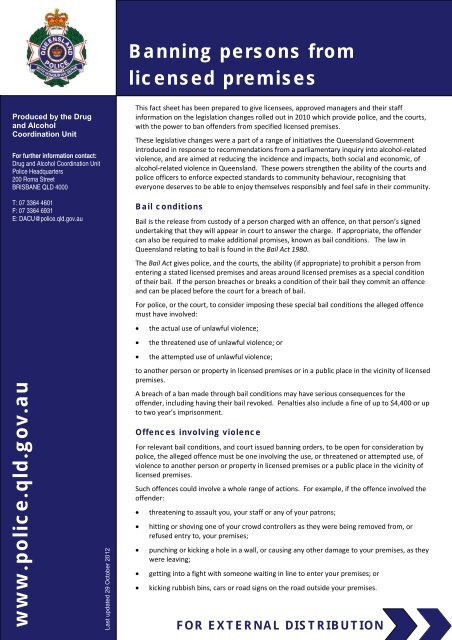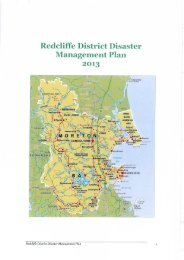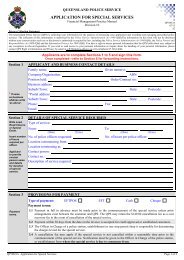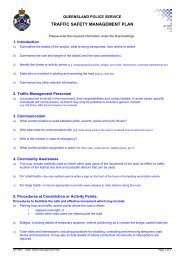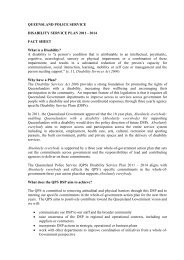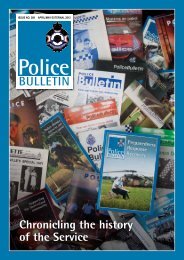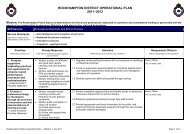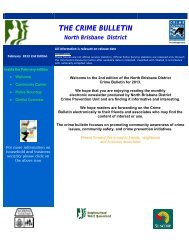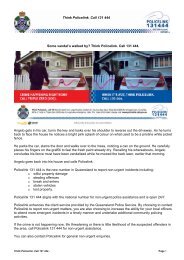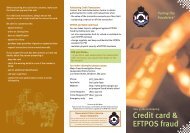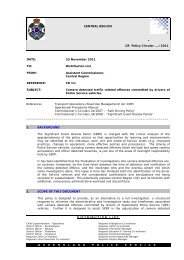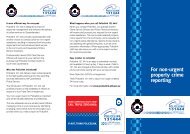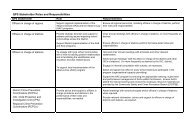Banning Orders Information Sheet - Queensland Police Service ...
Banning Orders Information Sheet - Queensland Police Service ...
Banning Orders Information Sheet - Queensland Police Service ...
Create successful ePaper yourself
Turn your PDF publications into a flip-book with our unique Google optimized e-Paper software.
<strong>Banning</strong> persons from<br />
licensed premises<br />
Produced by the Drug<br />
and Alcohol<br />
Coordination Unit<br />
For further information contact:<br />
Drug and Alcohol Coordination Unit<br />
<strong>Police</strong> Headquarters<br />
200 Roma Street<br />
BRISBANE QLD 4000<br />
This fact sheet has been prepared to give licensees, approved managers and their staff<br />
information on the legislation changes rolled out in 2010 which provide police, and the courts,<br />
with the power to ban offenders from specified licensed premises.<br />
These legislative changes were a part of a range of initiatives the <strong>Queensland</strong> Government<br />
introduced in response to recommendations from a parliamentary inquiry into alcohol‐related<br />
violence, and are aimed at reducing the incidence and impacts, both social and economic, of<br />
alcohol‐related violence in <strong>Queensland</strong>. These powers strengthen the ability of the courts and<br />
police officers to enforce expected standards to community behaviour, recognising that<br />
everyone deserves to be able to enjoy themselves responsibly and feel safe in their community.<br />
T: 07 3364 4601<br />
F: 07 3364 6931<br />
E: DACU@police.qld.gov.au<br />
www.police.qld.gov.au<br />
Last updated 29 October 2012<br />
Bail conditions<br />
Bail is the release from custody of a person charged with an offence, on that person’s signed<br />
undertaking that they will appear in court to answer the charge. If appropriate, the offender<br />
can also be required to make additional promises, known as bail conditions. The law in<br />
<strong>Queensland</strong> relating to bail is found in the Bail Act 1980.<br />
The Bail Act gives police, and the courts, the ability (if appropriate) to prohibit a person from<br />
entering a stated licensed premises and areas around licensed premises as a special condition<br />
of their bail. If the person breaches or breaks a condition of their bail they commit an offence<br />
and can be placed before the court for a breach of bail.<br />
For police, or the court, to consider imposing these special bail conditions the alleged offence<br />
must have involved:<br />
• the actual use of unlawful violence;<br />
• the threatened use of unlawful violence; or<br />
• the attempted use of unlawful violence;<br />
to another person or property in licensed premises or in a public place in the vicinity of licensed<br />
premises.<br />
A breach of a ban made through bail conditions may have serious consequences for the<br />
offender, including having their bail revoked. Penalties also include a fine of up to $4,400 or up<br />
to two year’s imprisonment.<br />
Offences involving violence<br />
For relevant bail conditions, and court issued banning orders, to be open for consideration by<br />
police, the alleged offence must be one involving the use, or threatened or attempted use, of<br />
violence to another person or property in licensed premises or a public place in the vicinity of<br />
licensed premises.<br />
Such offences could involve a whole range of actions. For example, if the offence involved the<br />
offender:<br />
• threatening to assault you, your staff or any of your patrons;<br />
• hitting or shoving one of your crowd controllers as they were being removed from, or<br />
refused entry to, your premises;<br />
• punching or kicking a hole in a wall, or causing any other damage to your premises, as they<br />
were leaving;<br />
• getting into a fight with someone waiting in line to enter your premises; or<br />
• kicking rubbish bins, cars or road signs on the road outside your premises.<br />
FOR EXTERNAL DISTRIBUTION
Court issued banning orders<br />
The Penalties and Sentences Act 1992 provides that a<br />
banning order can be imposed by the court on an offender’s<br />
conviction. A court issued banning order can prohibit an<br />
offender from entering or remaining in stated licensed<br />
premises, during stated hours and/or at stated events, and<br />
can be for a term of up to 12 months.<br />
In order for the court to make a banning order:<br />
• the offender must be convicted of an offence that<br />
involved the use, or threatened or attempted use, of<br />
violence to a person or property; and<br />
• the offence must have been committed in licensed<br />
premises or in a public place in the vicinity of licensed<br />
premises.<br />
The court must also be satisfied that, unless the order is<br />
made, the offender would pose an unacceptable risk to the<br />
good order of, or the safety and wellbeing of persons<br />
attending, licensed premises and areas in the vicinity of<br />
licensed premises.<br />
Penalties for breaching a court issued banning order include<br />
a fine of up to $4,400 or up to one year’s imprisonment.<br />
• Don’t ignore bad behaviour. As licensees you have an<br />
obligation to maintain a safe environment for your<br />
patrons and staff at your premises. You have the right<br />
to remove or refuse entry to people exhibiting<br />
disorderly or other inappropriate behaviour.<br />
• Let police know of breaches. It is an offence for<br />
someone to breach their bail conditions or a court<br />
issued banning order, but police can not respond to<br />
these breaches unless they are aware of them. Contact<br />
police immediately you become aware of a breach.<br />
More information<br />
For more information on banning powers, and other<br />
matters relating to your venue, visit the Office of Liquor and<br />
Gaming Regulation website at www.olgr.qld.gov.au.<br />
How will I know if someone is banned?<br />
Both the Bail Act and Penalties and Sentences Act provide<br />
for police to give information on the relevant bail condition<br />
or banning order to licensees, permittees or approved<br />
managers stated in the bail condition or court issued<br />
banning order.<br />
The information you receive from police will include the<br />
name of the offender and details relevant to the offender’s<br />
bail conditions or court issued banning order. <strong>Police</strong> are not<br />
authorised to provide you with a photo of the offender.<br />
What can licensed premises do to help<br />
police?<br />
Relevant bail conditions and court issued banning orders<br />
ensure that patrons who have endangered public safety<br />
through violence can be held to account and constrained<br />
from doing the same thing again.<br />
• Call police! <strong>Police</strong> can only act on incidents that have<br />
been reported to police. Moreover, police would much<br />
rather be called to an incident before it becomes a<br />
serious problem.<br />
• Ask police to consider banning the offender. It is at<br />
the police officers discretion as to whether an offender<br />
is charged with an offence, what bail conditions are<br />
appropriate and if a court issued banning order will be<br />
applied for. However, if your venue has a serious issue<br />
with an offender, and the safety of yourself, your staff<br />
and your patrons is of concern, raise this immediately<br />
with the police officer(s) attending the incident.<br />
Last updated 29 October 2012<br />
FOR EXTERNAL DISTRIBUTION


